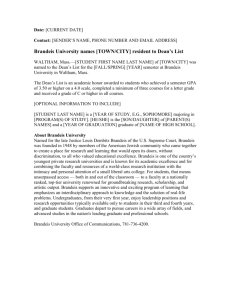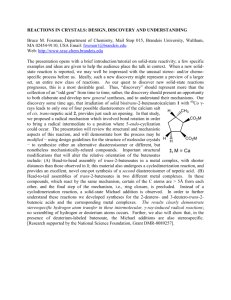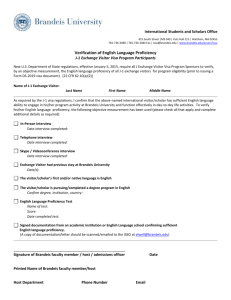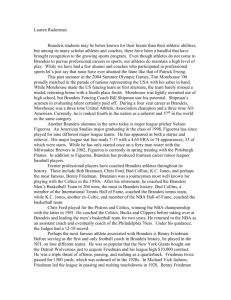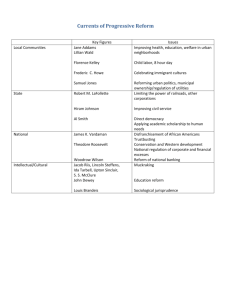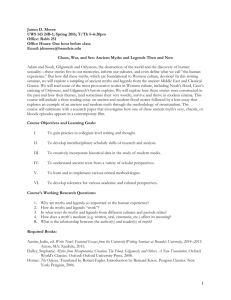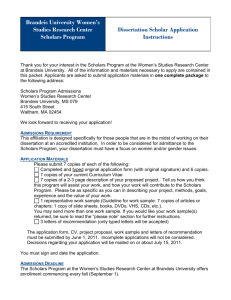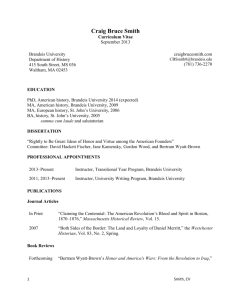Louis Brandeis Biography
advertisement
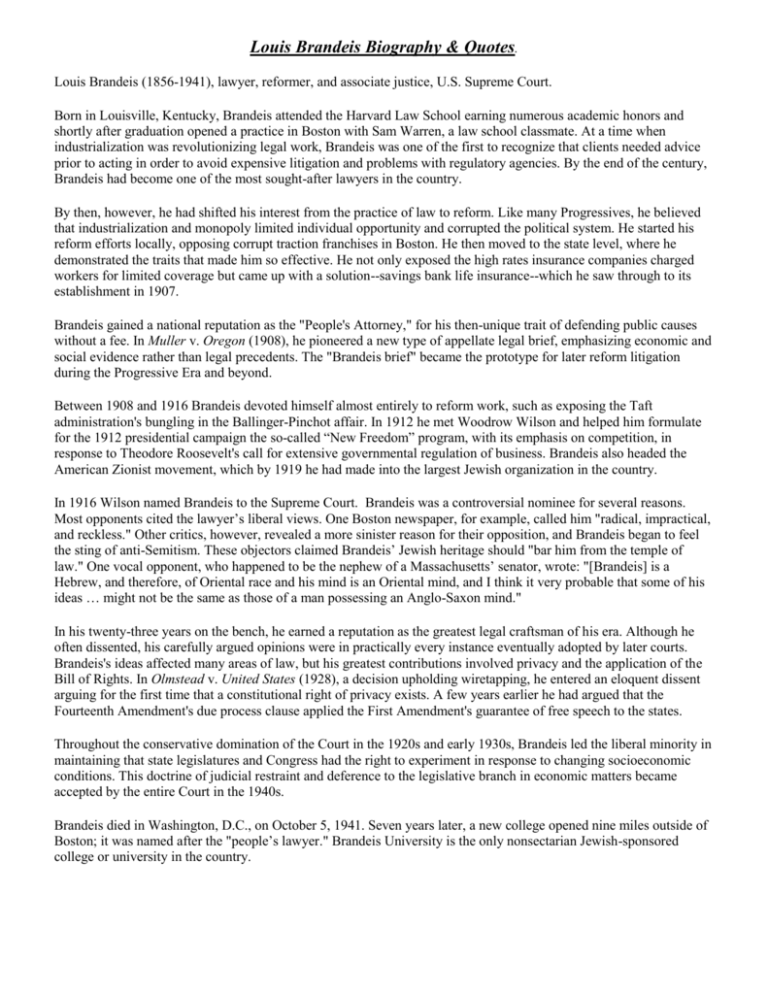
Louis Brandeis Biography & Quotes. Louis Brandeis (1856-1941), lawyer, reformer, and associate justice, U.S. Supreme Court. Born in Louisville, Kentucky, Brandeis attended the Harvard Law School earning numerous academic honors and shortly after graduation opened a practice in Boston with Sam Warren, a law school classmate. At a time when industrialization was revolutionizing legal work, Brandeis was one of the first to recognize that clients needed advice prior to acting in order to avoid expensive litigation and problems with regulatory agencies. By the end of the century, Brandeis had become one of the most sought-after lawyers in the country. By then, however, he had shifted his interest from the practice of law to reform. Like many Progressives, he believed that industrialization and monopoly limited individual opportunity and corrupted the political system. He started his reform efforts locally, opposing corrupt traction franchises in Boston. He then moved to the state level, where he demonstrated the traits that made him so effective. He not only exposed the high rates insurance companies charged workers for limited coverage but came up with a solution--savings bank life insurance--which he saw through to its establishment in 1907. Brandeis gained a national reputation as the "People's Attorney," for his then-unique trait of defending public causes without a fee. In Muller v. Oregon (1908), he pioneered a new type of appellate legal brief, emphasizing economic and social evidence rather than legal precedents. The "Brandeis brief" became the prototype for later reform litigation during the Progressive Era and beyond. Between 1908 and 1916 Brandeis devoted himself almost entirely to reform work, such as exposing the Taft administration's bungling in the Ballinger-Pinchot affair. In 1912 he met Woodrow Wilson and helped him formulate for the 1912 presidential campaign the so-called “New Freedom” program, with its emphasis on competition, in response to Theodore Roosevelt's call for extensive governmental regulation of business. Brandeis also headed the American Zionist movement, which by 1919 he had made into the largest Jewish organization in the country. In 1916 Wilson named Brandeis to the Supreme Court. Brandeis was a controversial nominee for several reasons. Most opponents cited the lawyer’s liberal views. One Boston newspaper, for example, called him "radical, impractical, and reckless." Other critics, however, revealed a more sinister reason for their opposition, and Brandeis began to feel the sting of anti-Semitism. These objectors claimed Brandeis’ Jewish heritage should "bar him from the temple of law." One vocal opponent, who happened to be the nephew of a Massachusetts’ senator, wrote: "[Brandeis] is a Hebrew, and therefore, of Oriental race and his mind is an Oriental mind, and I think it very probable that some of his ideas … might not be the same as those of a man possessing an Anglo-Saxon mind." In his twenty-three years on the bench, he earned a reputation as the greatest legal craftsman of his era. Although he often dissented, his carefully argued opinions were in practically every instance eventually adopted by later courts. Brandeis's ideas affected many areas of law, but his greatest contributions involved privacy and the application of the Bill of Rights. In Olmstead v. United States (1928), a decision upholding wiretapping, he entered an eloquent dissent arguing for the first time that a constitutional right of privacy exists. A few years earlier he had argued that the Fourteenth Amendment's due process clause applied the First Amendment's guarantee of free speech to the states. Throughout the conservative domination of the Court in the 1920s and early 1930s, Brandeis led the liberal minority in maintaining that state legislatures and Congress had the right to experiment in response to changing socioeconomic conditions. This doctrine of judicial restraint and deference to the legislative branch in economic matters became accepted by the entire Court in the 1940s. Brandeis died in Washington, D.C., on October 5, 1941. Seven years later, a new college opened nine miles outside of Boston; it was named after the "people’s lawyer." Brandeis University is the only nonsectarian Jewish-sponsored college or university in the country. Famous Quotes by Louis Brandeis: America has believed that in differentiation, not in uniformity, lies the path of progress. It acted on this belief; it has advanced human happiness, and it has prospered. Experience teaches us to be most on our guard to protect liberty when the government's purposes are beneficent. Fear of serious injury alone cannot justify oppression of free speech and assembly. Men feared witches and burnt women. It is the function of speech to free men from the bondage of irrational fears. I abhor averages. I like the individual case. A man may have six meals one day and none the next, making an average of three meals per day, but that is not a good way to live. If we desire respect for the law, we must first make the law respectable. Most of the things worth doing in the world had been declared impossible before they were done. Organization can never be a substitute for initiative and for judgment. Our government... teaches the whole people by its example. If the government becomes the lawbreaker, it breeds contempt for law; it invites every man to become a law unto himself; it invites anarchy. The greatest dangers to liberty lurk in insidious encroachment by men of zeal, well-meaning but without understanding. The most important political office is that of the private citizen. Those who won our independence... valued liberty as an end and as a means. They believed liberty to be the secret of happiness and courage to be the secret of liberty. To declare that in the administration of criminal law the end justifies the means, to declare that the Government may commit crimes in order to secure conviction of a private criminal would bring terrible retribution. We are not won by arguments that we can analyze, but by tone and temper; by the manner, which is the man himself. We can have democracy in this country, or we can have great wealth concentrated in the hands of a few, but we can't have both.
